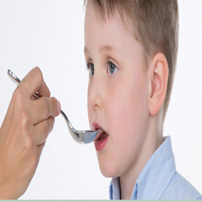Parents Accidentally Giving Children Too Much Medication
December 30, 2016 A new study shows that children are at risk for taking too much medication when their parents use measuring cups as opposed to oral syringes to administer dosages. The study, conducted by a group of pediatric health clinics throughout the United States, showed that the majority of these medicine overdoses occurred with liquid medications.
A new study shows that children are at risk for taking too much medication when their parents use measuring cups as opposed to oral syringes to administer dosages. The study, conducted by a group of pediatric health clinics throughout the United States, showed that the majority of these medicine overdoses occurred with liquid medications.
Part of the problem is that there are a variety of formats that the dosages are determined by, such as teaspoons, tablespoons, mL or milliliters. Sometimes a measuring tool comes with the medicine, but far too often the unit of measurement documented on the tool is different from the unit used on the instruction label of the medication. This confuses many parents and caregivers, and contributes to children receiving sometimes twice as much of a medicine as the proper medical dose prescribes.
Although the Food and Drug Administration (FDA) made a recommendation three years ago that labels and measuring tools should be streamlined, utilizing the same measurement units across the board, the recommendation was not mandated or federally required. In 2015, the American Academy of Pediatrics made a similar recommendation and advocated for children’s medications to have a standard, milliliter-only format to lessen the amount of confusion and overdosing that has happened as a consequence of these varying labeling techniques.
The results of the pediatric study were shocking. There were more than 2,000 parents who participated, and in all of the trials more than 84% of them made a minimum of one medication dosing error. Out of those 84%, nearly 70% of the errors were overdosing ones. Perhaps even more frightening was that more than one-fifth of the parents who participated measured out at least two times the prescribed amount of medication. The study revealed that the smaller the prescribed dose, the more likely it was for an overdosing error to occur.
The crux of the problem, according to the study, was the measurement tool used to dole out medication. Although the prescribed dose contributed to this issue, it was in fact the tool that had the largest effect on the margin of error. When an oral syringe was used, the chance of error diminished greatly. But, when a measuring cup was used, the likelihood of an overdose went up drastically. Perhaps this is because an oral syringe has a clearer level of measurement and administration, as opposed to the measuring cup. Whatever the exact reason, the study showed that when parents gave their children medicine with a measuring cup, the chance of making a potentially dangerous mistake went up four-fold.
The associate professor of pediatrics at New York University, Dr. Yin, strongly urged parents to use oral syringes when giving medication to their children. Dr. Yin noted that if a medicine does not come standard with an oral syringe, that medical providers should give them to families to use instead. It is important to keep in mind that many major stores also sell oral syringes that parents can use instead of the measuring cups that often come with over-the-counter children’s medicines. As always, please remember that it is important to consult directly with a healthcare professional in regard to all medical questions and concerns. We hope that this information aids in keeping you and your loved ones healthy, and can act as a critical reminder when it comes to administering medications safely.
Philadelphia Lawyers at Galfand Berger, LLP Advocate For Children’s Medication to Have a Measurement Standard
The lawyers at Galfand Berger have successfully represented clients in many practice areas of law. If you or any of your loved ones have legal questions, an attorney at Galfand Berger, LLP can help. With offices located in Philadelphia, Reading and Bethlehem, we serve clients throughout Pennsylvania and New Jersey. To schedule a consultation, call us at 800-222-8792 or complete our online contact form.
 Google Screened
Google Screened
